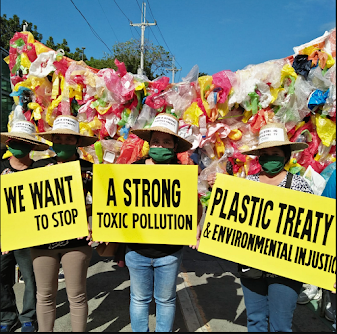Industry Plays Over-sized Role in UN Ottawa Negotiations
Industry Plays Over-sized Role in
UN Ottawa Plastics Negotiations
The United Nations has taken up the problem of plastics and is in the midst of negotiating an international treaty ostensibly to begin to limit the production, distribution, use, and disposal of the overwhelming amount of plastics in our waterways, land, waste sites, and the bodies of both humans and animals.
As can be expected, industry played an oversized role, having significant and virtually unencumbered access to conference proceedings while activists, academic researchers, and environmental groups were held at the fringes of the conference. Companies like Dow and ExxonMobil. These companies are eyeing extraordinary profits from the production and sale of plastics, the burden of managing plastic waste is left to us - tax payers and the governments we elect to try to dispose of the waste. Corporations like Dow and ExxonMobil went all in on promoting themselves as being crucial to the life and health of humans. For sure, plastics do play a role in society that can be construed as good. However, the overwhelming amount of single use plastics that plague our existence today and every day is truly suffocating us.
We've said it before, the production of plastics is toxic. The disposal of plastics is extremely problematic and recycling including chemical recycling are just not a solution despite the noise created by corporations to lead us to believe otherwise. Expert scientists warn that the only solution here is to reduce the amount of plastics in our lives.
The United Nations Environmental Programme (UNEP) moves from Ottawa, its fourth negotiating session, toward developing a binding treaty by the end of 2024. It is so critical for our health and the health of our natural environments that this treaty set the reduction in plastic production and waste in motion to which all countries of the world are obligated. Corporations will continue to position themselves as developing critical products. We know, however, that plastic is highly toxic, problematic, and will absolutely ruin us unless we being to stem the tide of plastics, especially single use plastics.



Comments
Post a Comment